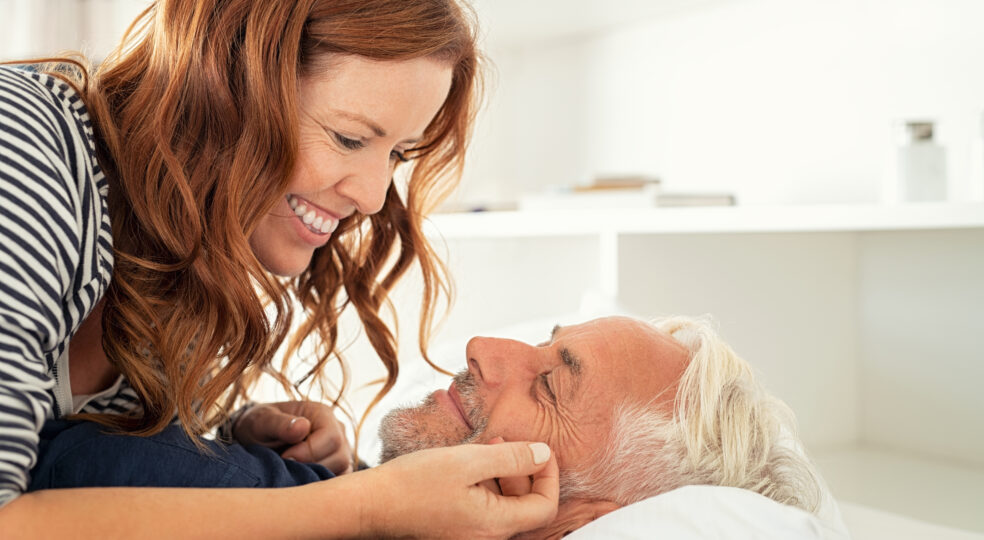
Contrary to numerous prejudices, the need for sexuality by no means ends just because we reach a certain age. Nevertheless, the topic of sex in old age is still taboo. This fact makes it difficult for many seniors to live out a fulfilled sexuality. In addition, there are often physical and emotional problems.
No question: Sexuality changes with age. But this change does not necessarily have to be negative. Quite the opposite. It is even possible to enjoy sex even more intensively than when you were younger. The following article provides information on how this can work.
It has long been scientifically proven that libido as well as the ability to orgasm persist into old age. Nevertheless, sexuality changes considerably over the years. Women as well as men often feel less sexual desire at an older age, which can be due to physical as well as emotional causes.
However, these natural changes by no means mean that love life has to be less fulfilling than in younger years. The topic of sex merely takes on a new significance for many couples who have been married for many years. In addition to physical passion, which still plays a role, sex becomes much more an expression of closeness and connection.
Quality before quantity: That's how you could describe sex life in old age. While the frequency of sexual intercourse decreases, the demands increase. After all, experienced people know what they want and what they don't want. This can be a great advantage in terms of a fulfilling love life.
For some couples, sexuality falls completely asleep in old age. As long as both parties are satisfied with platonic love, there is no reason to put yourself under unnecessary pressure. However, if there is a desire for sexuality, you can actively contribute to a fulfilling love life even at an older age. Below we have summarized the six best tips.
Granted, it's easier said than done, but it's still worth breaking away from the prevailing beauty ideals. Accept your body with all its facets. You have collected a lot of life experience, which one may also look at you. Deal lovingly with your supposed flaws. Only when you are at peace with yourself will you be sexually attractive to your partner.
Even a long-term relationship needs to be nurtured. If the erotic mood no longer arises in your everyday life, a romantic weekend or even just a lovingly prepared dinner by candlelight can work wonders. Woo your partner as you did at the beginning of your relationship.
A common cause of sexual unwillingness in old age are sexual problems such as vaginal dryness or erectile dysfunction. The former, however, can be wonderfully remedied with lubricant gel. Men don't have to be ashamed if they help their erection with sexual enhancers. The only thing that counts is the result. Aids are no Admission of sexual failure.
Attention: If you are chronically ill or taking medication, consult your doctor beforehand. An alternative to sexual enhancers is, for example, a tension ring. However, make sure you use it correctly.
Sexual pressure to perform is already an absolute libido killer at a young age. This is even more true at an advanced age. Have sex because it gives you pleasure, not to prove something to yourself. Don't let yourself be pressured by stories from acquaintances or magazine articles about fit seniors. The need for sexuality in old age is individually different.
If you have a much younger partner, the sexual desire may be different. Perhaps the passion of your young partner can inspire you. If not, it is important to find a common denominator. Sexuality does not have to mean intercourse. There are other ways to be affectionate.
Over the years, sexual routine creeps into many relationships. If both partners don't really enjoy lovemaking (anymore), the likelihood that nothing will happen at all is pretty high. But you can use the advantage of your age: You no longer have to experiment, but know exactly what you like.
Dare to communicate openly with your partner about your desires. This is especially true if you would like to try something different. You may both discover completely new sides to each other.
Sometimes sexuality falls asleep in old age simply due to a lack of a partner. Many seniors believe that they would no longer find anyone with whom they can share affection and passion. However, this does not have to be the case. There are now numerous singles exchanges that specifically target the older generation.
If you don't trust online dating, you can try other options. For example, how about a singles vacation or membership in a club of your interest? In this way, you get to know many different people. It is possible that a new, potential partner is among them.

A common reason why sexuality takes a back seat in old age is health problems. However, this is not generally a phenomenon of the older generation. Young people who are physically unwell also lose interest in sex, at least temporarily. In old age, however, physical impairments occur significantly more often.
Chronic illnesses and the resulting long-term use of medication, as well as previous operations, can have a negative impact on sexual life. Sometimes sexual function is directly impaired by the respective disease or medication, or sexual intercourse causes pain. Often, seniors also no longer feel attractive due to their limitations.
Sexual aversion in old age is common in men and women. equally due to hormonal changes. With the onset of menopause, estrogen levels in women drop rapidly. This leads not only to a reduced libido, but also to a dry vaginal mucosa. The latter can cause pain during sexual intercourse.
In men over 50, testosterone levels drop, which leads to a decrease in the desire for sex. Furthermore, erectile dysfunction and premature ejaculation may occur. The fear of sexual failure additionally reduces the desire.
Emotional factors play almost as big a role in impaired sexuality in old age as physical limitations. The modern beauty ideals of our society falsely convey the impression that sexuality is reserved only for young, healthy and beautiful people. Those who do not conform to this ideal (anymore) often withdraw.
What is considered desirable lies solely in the eye of the beholder. A body shaped by life lived can be just as attractive as young, flawless skin. Undoubtedly in a different way, but no less valuable. Nevertheless, many seniors find it difficult to break away from society's beauty ideals. Shame and shyness hinder desire and passion.
Those who are plagued by self-doubt also radiate this. The probability of finding a partner decreases accordingly. Incidentally, this applies regardless of age. Even in a long-term marriage, a negative approach to one's (aged) appearance can inhibit sexuality.
Due to hormonal changes - in both women and men - libido actually decreases with advancing age. In women, the hormone estrogen plays a key role; in men, it is the sex hormone testosterone.
Falling hormone levels affect general excitability, vaginal moisture in women, and erectile function in men. If problems increase, this can have a discouraging effect. In addition, other values within the partnership gain in importance with increasing age, so that sexuality no longer has a dominant priority.
Nevertheless, very few seniors want to give up sex completely. The need remains, albeit usually diminished. The extent to which the desire for sexuality is pronounced in old age can also vary greatly from person to person. While some couples live together platonically at some point, other seniors are specifically looking for new fulfilling experiences: Both are normal and fine.
Sexuality means diversity - regardless of age. Therefore, there is no such thing as typical age-related sexuality. Every person is individual and has his or her own desires and needs. The facets of love and sexuality know no age limit: there are monogamous, polyamorous, queer and heterosexual seniors. Volitional asexuality is also a legitimate facet of this spectrum.
A special feature of sexuality in old age, as already mentioned, is the social taboo that still exists. Many seniors believe that it is inappropriate to live out their sexuality in view of their age. Only in recent years has there been an increasing change in thinking.
Sexuality in old age, by the way, also exists in the case of illness and even need for care. Recognizing the desire for sexuality as a fundamental right and, for example, granting privacy to married couples in nursing homes, is increasingly becoming the focus of public awareness.
The topic of sexuality in old age is (unfortunately) hardly present in most people's minds, because no one likes to talk about it. But where does this taboo come from in our otherwise so open-minded society? One reason could be the generational inhibitions of seniors themselves. In the days of our grandparents, an open approach to the subject of sexuality was by no means as natural as it is today.
The shameful, inadequate or even missing education in youth leads to the conviction that one is not allowed to talk about sexual desires, which sticks until old age. This is often compounded by moral or religious concerns. Traditional gender roles make it particularly difficult for women to express their sexual needs.
Moreover, because sexuality is rarely discussed in old age, many young people assume that it simply no longer takes place. Representative Surveys however, more than half of all men and women between the ages of 50 and 70 are still regularly sexually active.
Among the over-80s, it is still one in ten men and one in five women.
The desire for sexuality is not a question of age. Seniors also have a need - and a right - to intimacy. The greatest difficulty lies in resisting the social taboo and reducing personal doubts. Sexual attractiveness, contrary to what the media suggest, is by no means linked to youth and vitality.
Seniors who want to actively shape their love life have numerous options. The use of suitable aids as well as the use of partner exchanges is perfectly legitimate. Even in a long-standing marriage, passion can be rekindled with a little commitment. However, if the interest in sex has waned on both sides, this is also okay.

